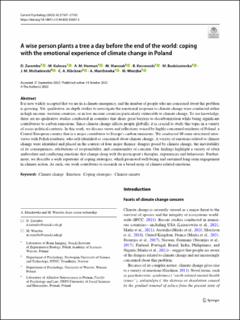A wise person plants a tree a day before the end of the world: coping with the emotional experience of climate change in Poland.
Zaremba, Dominika; Kulesza, Maria; Herman, Aleksandra; Marczak, Michalina Konstancja; Kossowski, Bartosz; Budziszewska, Magdalena; Michałowski, Jarosław; Klöckner, Christian Andreas Nikolaus; Marchewka, Artur; Wierzba, Małgorzata
Peer reviewed, Journal article
Published version
Permanent lenke
https://hdl.handle.net/11250/3100557Utgivelsesdato
2022Metadata
Vis full innførselSamlinger
- Institutt for psykologi [3141]
- Publikasjoner fra CRIStin - NTNU [38680]
Sammendrag
It is now widely accepted that we are in a climate emergency, and the number of people who are concerned about this problem is growing. Yet, qualitative, in-depth studies to investigate the emotional response to climate change were conducted either in high-income, western countries, or in low-income countries particularly vulnerable to climate change. To our knowledge, there are no qualitative studies conducted in countries that share great barriers to decarbonization while being significant contributors to carbon emissions. Since climate change affects people globally, it is crucial to study this topic in a variety of socio-political contexts. In this work, we discuss views and reflections voiced by highly concerned residents of Poland, a Central European country that is a major contributor to Europe's carbon emissions. We conducted 40 semi-structured interviews with Polish residents, who self-identified as concerned about climate change. A variety of emotions related to climate change were identified and placed in the context of four major themes: dangers posed by climate change, the inevitability of its consequences, attributions of responsibility, and commonality of concern. Our findings highlight a variety of often ambivalent and conflicting emotions that change along with the participant’s thoughts, experiences and behaviours. Furthermore, we describe a wide repertoire of coping strategies, which promoted well-being and sustained long-term engagement in climate action. As such, our work contributes to research on a broad array of climate-related emotions.

